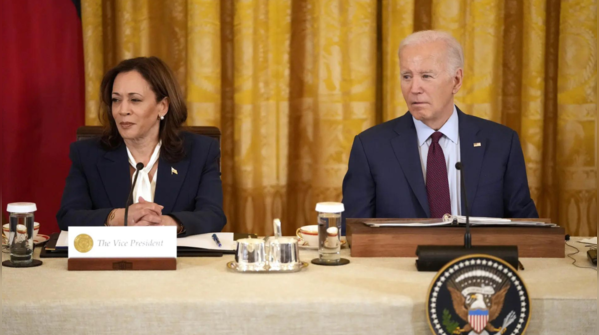- News
- World News
- US News
- From Biden to Truman: A look at US Presidents who dropped out of Presidential race
From Biden to Truman: A look at US Presidents who dropped out of Presidential race

Biden drops out, amid pressure from Democrats
President Joe Biden announced Sunday his withdrawal from the 2024 reelection race against Donald Trump, creating uncertainty in the White House race. As, the Democratic Party now scrambles to find a candidate by November, Vice President Kamala Harris emerges as the frontrunner. Key figures, including Hillary and Bill Clinton, Senator Elizabeth Warren, and Congresswoman Alexandria Ocasio-Cortez, support Harris, consolidating mainstream party backing behind her. (Photo credit: AP)

Lyndon B. Johnson (1963-1969)
Lyndon B. Johnson announced he would not seek reelection in 1968, surprising the nation. Despite significant achievements in civil rights and social programs under his Great Society initiative, his presidency was marred by the unpopular Vietnam War and domestic unrest. Johnson's decision was influenced by his declining popularity, the strain of the war on his administration, and the desire to focus on achieving peace. (Photo credit: White House history)

Rutherford B. Hayes (1877-1881)
Rutherford B. Hayes had pledged during his campaign to serve only one term if elected. His presidency focused on restoring integrity to the office after the disputed 1876 election, ending Reconstruction, and reforming the civil service. Hayes honored his promise, believing that a single term would help reduce the potential for corruption and entrenchment in power. (Photo credit: White House history)

James K. Polk (1845-1849)
James K. Polk decided not to seek reelection after achieving his primary goals, including significant territorial expansion through the Oregon Treaty and the Mexican-American War. His administration fulfilled its promises, but the efforts took a toll on his health. Polk believed he had accomplished his mission and chose to step down, stating he would not run for a second term. He died just three months after leaving office due to declining health. (Photo credit: White House history)

James Buchanan (1857-1861)
James Buchanan did not seek reelection due to the immense national turmoil over slavery and states' rights. His presidency saw the nation edge closer to civil war, and his inability to effectively address these issues led to significant criticism. Buchanan's decision not to run for a second term was influenced by his lack of popularity and the Democratic Party's internal divisions. He is often regarded as one of the least effective presidents in dealing with the secession crisis. (Photo credit: White House history)

Calvin Coolidge (1923-1929)
Calvin Coolidge, after completing Warren G. Harding’s term and winning a full term of his own, chose not to seek reelection in 1928. Coolidge believed that ten years in office was too long for any president, emphasizing the importance of not overstaying one's welcome in power. His administration is remembered for its economic policies and a period of significant growth known as the Roaring Twenties. Coolidge's decision reflected his personal principles and the belief in the proper limits of executive power. (Photo credit: White House history)

Harry S. Truman (1945-1953)
Harry S. Truman decided not to seek another term in 1952, after nearly eight years in office. His presidency faced significant challenges, including the Korean War, the beginning of the Cold War, and domestic issues like labor strikes and civil rights. Truman's popularity had declined, and he recognized the strain of the presidency on his health and personal life. His decision was also influenced by the Democratic Party's internal dynamics and the rising popularity of other candidates. (Photo credit: White house history)

Biden bids farewell
President Joe Biden, who had previously dismissed calls from top Democrats to end his reelection bid, made a surprising announcement on Sunday, revealing his decision to withdraw from the 2024 presidential race. According to Reuters, the choice was made following "a tense 48 hours of scrutinising polling data that indicated his chances of securing a second term were dwindling," as reported by two sources familiar with the situation. (Photo credit: Agencies)









